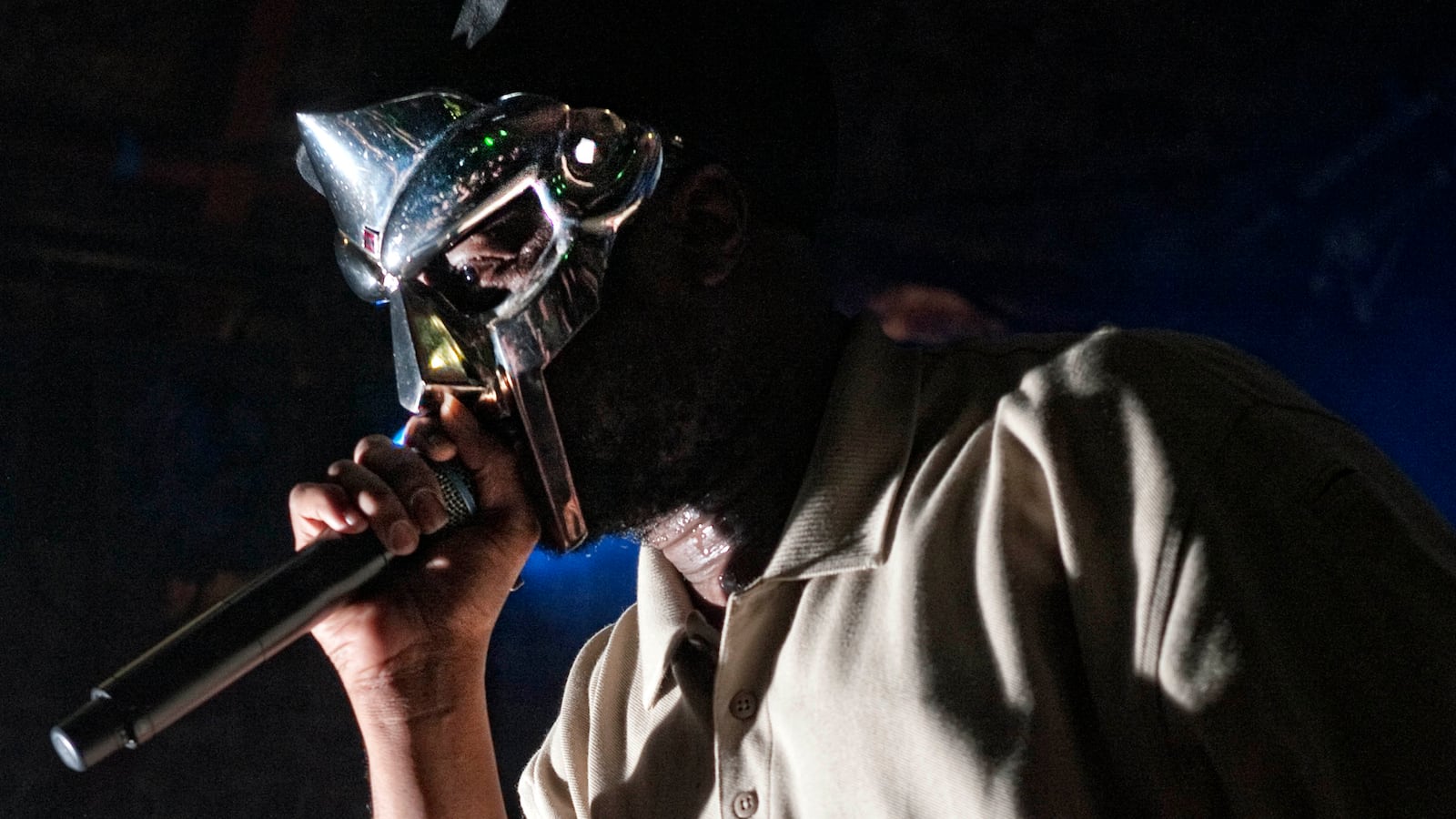It was a warm summer day and I was too high when I discovered “Rhymes Like Dimes.” Daniel Dumile, who will be forever known as the lead persona of his iconic slate of character aliases, MF DOOM, styled in ALL CAPS, left a stark impression on me. His energy made a mark on an entire genre.
After a modest but promising start in the early 1990s with the group KMD (Kausing Much Damage), Dumile, along with his brother, Dingilizwe a.k.a. DJ Subroc, were on the verge of establishing themselves in the hippie-hop Black consciousness sect occupied by fellow Long Islanders, De La Soul. The 3rd Bass single “The Gas Face” previewed the playful, invasive Zev Love X, as Daniel was then known, with the secret weapon cameo that set the song apart from contemporaries. Even there, a quick flip of his urgent sticky syllables shows a rhyming aplomb uncommon for that time: “Is I'm talkin coffee or cocoa, is you loco? Cash or credit for unleaded at Sunoco.” Unfortunately, his brother died trying to cross the Nassau Expressway and, when KMD’s second album was shelved, Dumile entered his first major break from public life.
When he reappeared, if that’s the word, nearly a decade later, he wore a mask and called himself MF DOOM, after the Marvel universe villain. Much like the comic book archetype, he had revealed his origin story, wrought from the pain of his brother’s death but also set to a purpose: study the art, not the artist. Shielded by his mask, he was so secretive about his life that he effectively hid his death, an unheard of ending for a well known and closely followed figure in American pop culture. His wife Jasmin announced on New Year’s Eve that he had passed away on the day of Halloween. In the replies, some commenters questioned the truth of it. Had DOOM pulled off his greatest vanishing act ever in some ruse or was this real?
In the studio apartment on 5th Avenue and Degraw in Brooklyn where I sat in the summer of 1999, when DOOM appeared, fully formed, with Operation: Doomsday, my friend was recording a single and rolling up endless joints for me and the producer to smoke. While I remained glued to the futon as if fastened to failed softness, he was making a go at his rap career, bopping to a smoothed out remix of Mad Lion’s “Take It Easy” on a shortened loop. When we were talking on Instant Messenger earlier, I saw that he’d left an away message with lyrics I thought were his: “Keep a pen like a fiend keep a pipe wit’ im/Gentleman who lent a pen to a friend who write wit’ im.” I asked him when he was going to spit those rhymes I’d seen in the message bubble.
“Oh nah those ain’t mine, kid.”
Those signature lines, with their insistent internal rhymes, their scattered thoughts, and artful nod to fellowship, were MF DOOM. That friendship, like the one with a cyclist weed dealer who stamps her wall with DOOM bumper stickers, or the producer who mined DOOM’s beat style to compose the score for his first documentary and then feature film, is like all of my DOOM-based bonds. We admired his attention to the craft over all else.
I found out MF DOOM died and messaged the same friend, who’s now been rapping for 13 years and recently released a vinyl, to ask him how he was feeling about the loss of rap’s avant garde patron saint.
“Not good, yo.”
MF DOOM remains wrapped in his self-styled folklore in a way I don’t think any other artist ever will be. He avoided fame like it was an illness because it is. The singular focus he placed on constructing couplets and creating funky loops — he produced most of his own beats, outside of a few collaborations with producers under group names — sealed him among the most prolific and innovative songwriters in popular culture. Not just in hip-hop, the genre he molded to fit his vast imaginative reach.
It makes sense why the young men who I first shared DOOM’s space with two decades ago, when the Dugout Crew would meet inside of a foggy apartment to share rhymes and jump up and down about new breakbeats mined from decades of jazz, rock and roll, reggae and soul, aren’t well now as we grasp the idea of his death. I know who my friends are. I have no idea who Daniel Dumile is because he created MF DOOM to make sure neither I nor anyone else would ever know. His elusive nature conditioned listeners to eschew idolatry and hear the words for what they were. The person behind a catalog of ferocious rhymes kept such a distance from those who consumed the songs that he was able to save his actual, whole self from the devouring public—a consumption that slowly kills—and rest in peace. That’s a luxury many artists never achieve: legendary renown without the trappings or the confines of fame.
He wore a mask. MF DOOM took the lesson of Paul Laurence Dunbar’s seminal poem and, mask on, mouthed with myriad subtleties to turn his career into a case study for anyone Black who wanted to create without limits. It seems simple enough in hindsight, but hiding one’s face has become a kind of political statement that DOOM invented. Current offspring on the DOOM tree include Brooklyn’s Leikeli47, New Jersey’s Mach-Hommy, and Atlanta’s RMR, each choosing some kind of face covering to throw fandom off their scent. When DOOM’s popularity surged, and the demand for performances stretched his means and challenged his boundaries, he sent out imposters to disrupt the idea of how we were allowed to witness his body.
Now that his body is gone, it hits harder that works like Operation Doomsday and Madvillainy were not tied to his waking life as Dumile. They were signals he sent from behind the mask that a Caribbean emigrant and London native had meshed his hybrid influences into tight idioms for curious word-lovers and sample junkies. MF DOOM could make you smile about liking to drink the last beer or being too high to talk to the pretty girl at the party. He was aware of himself enough not to impose his personal worries on the work but relatable enough to keep his tunes jovial, colloquial, and easy.
DOOM wasn’t a household name but an artist’s artist, a writer’s writer. We require too much of people who are makers. We need them to fit into our moral spectrum, to produce despite pain and loss, to give and give until quality wears away. Because DOOM was, by definition, uncompromising, his fans linked mainly by their love of style, by the art of hip-hop. He was a graffiti master, a humorist, a producer, and a writer so he paved a way through the intersection of those identities, welcoming a host of people who grounded themselves at any one of those four corners. I am hurt as a writer and as much as I am hurt as a music-lover as much as I am hurt as a painter. He touched artists by making art. That’s the only place he didn’t, and maybe couldn’t, withhold.
The best effect of hearing DOOM on that summer night when I rushed to download “ALL CAPS” for my MP3 player was an irrepressible urge to write bars. Since he pirouetted on the tightrope between the cliche and the uncanny, he multiplied what I believe language could do. He helped me nurture an intimate relationship with words. I am forever thankful to Daniel Dumile for including people like me even if it meant necessarily excluding himself.
The best way I can honor him is to cite a bar that shows his dexterity with metaphors and his eerie sentience about the legacy he’d leave:
On Doomsday, ever since the womb til I'm back
where my brother went, that's what my tomb will say
Right above my government, Dumile
Either unmarked or engraved, hey, who's to say”
His legacy is, of course, engraved.





